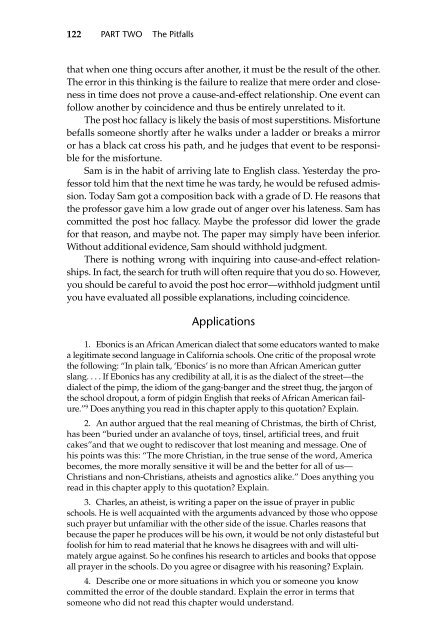Beyond Feelings
Beyond Feelings
Beyond Feelings
You also want an ePaper? Increase the reach of your titles
YUMPU automatically turns print PDFs into web optimized ePapers that Google loves.
122 PART TWO The Pitfalls<br />
that when one thing occurs after another, it must be the result of the other.<br />
The error in this thinking is the failure to realize that mere order and closeness<br />
in time does not prove a cause-and-effect relationship. One event can<br />
follow another by coincidence and thus be entirely unrelated to it.<br />
The post hoc fallacy is likely the basis of most superstitions. Misfortune<br />
befalls someone shortly after he walks under a ladder or breaks a mirror<br />
or has a black cat cross his path, and he judges that event to be responsible<br />
for the misfortune.<br />
Sam is in the habit of arriving late to English class. Yesterday the professor<br />
told him that the next time he was tardy, he would be refused admission.<br />
Today Sam got a composition back with a grade of D. He reasons that<br />
the professor gave him a low grade out of anger over his lateness. Sam has<br />
committed the post hoc fallacy. Maybe the professor did lower the grade<br />
for that reason, and maybe not. The paper may simply have been inferior.<br />
Without additional evidence, Sam should withhold judgment.<br />
There is nothing wrong with inquiring into cause-and-effect relationships.<br />
In fact, the search for truth will often require that you do so. However,<br />
you should be careful to avoid the post hoc error––withhold judgment until<br />
you have evaluated all possible explanations, including coincidence.<br />
Applications<br />
1. Ebonics is an African American dialect that some educators wanted to make<br />
a legitimate second language in California schools. One critic of the proposal wrote<br />
the following: “In plain talk, ‘Ebonics’ is no more than African American gutter<br />
slang. . . . If Ebonics has any credibility at all, it is as the dialect of the street—the<br />
dialect of the pimp, the idiom of the gang-banger and the street thug, the jargon of<br />
the school dropout, a form of pidgin English that reeks of African American failure.”<br />
9 Does anything you read in this chapter apply to this quotation? Explain.<br />
2. An author argued that the real meaning of Christmas, the birth of Christ,<br />
has been “buried under an avalanche of toys, tinsel, artificial trees, and fruit<br />
cakes”and that we ought to rediscover that lost meaning and message. One of<br />
his points was this: “The more Christian, in the true sense of the word, America<br />
becomes, the more morally sensitive it will be and the better for all of us—<br />
Christians and non-Christians, atheists and agnostics alike.” Does anything you<br />
read in this chapter apply to this quotation? Explain.<br />
3. Charles, an atheist, is writing a paper on the issue of prayer in public<br />
schools. He is well acquainted with the arguments advanced by those who oppose<br />
such prayer but unfamiliar with the other side of the issue. Charles reasons that<br />
because the paper he produces will be his own, it would be not only distasteful but<br />
foolish for him to read material that he knows he disagrees with and will ultimately<br />
argue against. So he confines his research to articles and books that oppose<br />
all prayer in the schools. Do you agree or disagree with his reasoning? Explain.<br />
4. Describe one or more situations in which you or someone you know<br />
committed the error of the double standard. Explain the error in terms that<br />
someone who did not read this chapter would understand.


